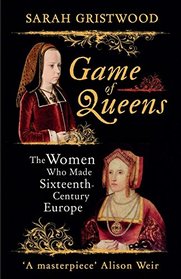Fascinating subjects, disappointing execution.
An overstated thesis and, in my opinion, poor organization made this a disappointing and frustrating read. I never really "bought" Gristwood's thesis that these "women who made 16th century Europe" represented a trend or a type. The women she writes about are fascinating, and I've very glad to have learned more about them, but efforts to shoehorn them into a "Game of Queens" metaphor ignores their crucial differences -- and even, you could argue, what made each one unique. There are Queens Regnant, Queens Consort, Regents (official and unofficial), powers behind the throne, even a couple of mistresses. There are wise women, and foolish women, victims and villain(esse)s. What there is not is anything that persuades me that this was more than an accident of history that meant that a number of women (capable and not-so-capable) found themselves in the right (or wrong) place at the right (or wrong) time.
Gristwood's decision to tell a complicated, multi-region story chronologically was, I think, a mistake. It isn't her fault that so many of her subjects were named Mary or Margaret (or, for the guys, Henry or Francois ...) but the way she bounces from place to place, and skids from year to year just make it so much harder to follow each one, as an individual. Important events happen, but their repercussions aren't felt for several chapters. (OR are felt again and again and again: I was convinced that King Ferdinand of Aragon died about three times ...) Individuals disappear from one sequence of events, only to pop up again somewhere else. In early chapters, as Gristwood tries to establish her "sisterhood" of ruling women, she relies a lot on 20/20 foresight, attempting to create deep connections where there really aren't any through the liberal use of "little did she know": "little did she know that one day she would face her one-time playmate ..." Well, she didn't know, did she, so how does it really matter?
These are, however, truly fascinating women, and it's really enlightening to have a book in which they are center stage, rather than taking walk-on parts in the lives and careers of their fathers, husbands, brothers or sons. I just wish they had been given a better-organized book.
An overstated thesis and, in my opinion, poor organization made this a disappointing and frustrating read. I never really "bought" Gristwood's thesis that these "women who made 16th century Europe" represented a trend or a type. The women she writes about are fascinating, and I've very glad to have learned more about them, but efforts to shoehorn them into a "Game of Queens" metaphor ignores their crucial differences -- and even, you could argue, what made each one unique. There are Queens Regnant, Queens Consort, Regents (official and unofficial), powers behind the throne, even a couple of mistresses. There are wise women, and foolish women, victims and villain(esse)s. What there is not is anything that persuades me that this was more than an accident of history that meant that a number of women (capable and not-so-capable) found themselves in the right (or wrong) place at the right (or wrong) time.
Gristwood's decision to tell a complicated, multi-region story chronologically was, I think, a mistake. It isn't her fault that so many of her subjects were named Mary or Margaret (or, for the guys, Henry or Francois ...) but the way she bounces from place to place, and skids from year to year just make it so much harder to follow each one, as an individual. Important events happen, but their repercussions aren't felt for several chapters. (OR are felt again and again and again: I was convinced that King Ferdinand of Aragon died about three times ...) Individuals disappear from one sequence of events, only to pop up again somewhere else. In early chapters, as Gristwood tries to establish her "sisterhood" of ruling women, she relies a lot on 20/20 foresight, attempting to create deep connections where there really aren't any through the liberal use of "little did she know": "little did she know that one day she would face her one-time playmate ..." Well, she didn't know, did she, so how does it really matter?
These are, however, truly fascinating women, and it's really enlightening to have a book in which they are center stage, rather than taking walk-on parts in the lives and careers of their fathers, husbands, brothers or sons. I just wish they had been given a better-organized book.




